A Brilliant Defense of White Nationalism
Gregory Hood, American Renaissance, March 18, 2022
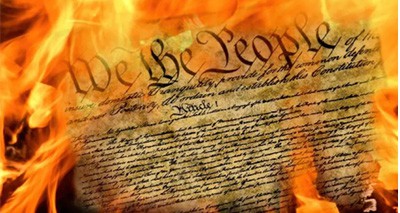
Elie Mystal, Allow Me to Retort: A Black Guy’s Guide to the Constitution, The New Press, 2022, 240pp, $16.83 hardcover, $14.74 Kindle
Subscribe to future audio versions of AmRen articles here.
If Elie Mystal didn’t exist, we’d invent him. I wonder if we did. In appearance, elocution, and legal reasoning, he’s the perfect straw man. Cable news takes him seriously. He can’t stop himself from blurting out what he really thinks about the Constitution, whites, and the so-called rule of law. His crude approach is refreshing. He clears away the hypocrisy that keeps the failed American experiment stumbling along.
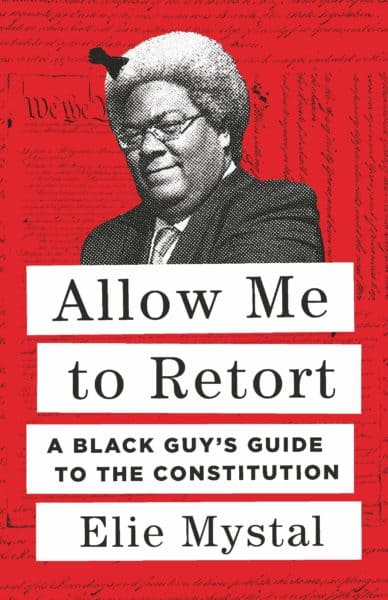
Many whites believe our individualist, universalistic, analytic worldview is shared by other peoples. It’s not. Racial identity is not important to many whites, but it’s fundamental to people of other races. Many whites believe in colorblindness and the promise (if not the reality) of an American civic identity. National Review even tried a compromise: reject Confederates but honor the Founders. Not surprisingly, progressives and non-whites don’t see why George Washington gets a pass.
Much of American Renaissance’s work is showing progressive hypocrisy on race. However, hypocrisy and denial of history are what keep diverse societies together. Ernest Renan argued that a nation is not based purely on race or language, but is a “daily referendum,” dependent both on aspirational myths and historical “forgetting” of atrocities. Even the reasonably homogenous France of his time couldn’t have held together if people were still fighting over the St. Bartholomew’s Day Massacre. If your interest is peace or unity, you don’t endlessly incite rage. We should suspect the motives of those who do. Of course, if we don’t necessarily want a polity to hold together, our opponents’ actions may serve our cause.
A nation is a fragile thing because it is based on myth as much as blood. It can’t be reduced to reason. Francis Fukuyama thought liberal democracy was the “End of History,” but even liberal democracy must draw on non-liberal sources for legitimacy, such as nationalist myths or cults of heroes. Carl Schmitt argued that the state can’t be neutral, or “classically liberal.” The “friend/enemy” distinction matters more than legislation or liberalism.
“The rule of law” is cold comfort. We are governed by men, not documents. If you replace rulers with those of another race, they will rule differently, no matter what the law says. We need whites to understand this, but that will be hard.
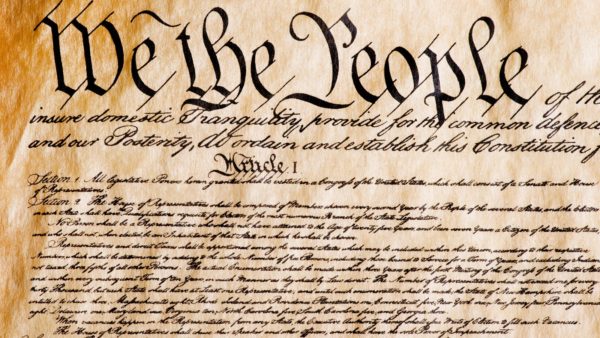
White Americans don’t like thinking about power this way. It’s too cynical, and we need idealism about our Founding and Constitution. We have no divine origin, no royal line, and our war of independence was against a people with “the same language, a similar religion, and kindred blood.” America was founded like a corporation, with a formal Declaration of Independence that makes specific, legalistic charges against King George III. Wealthy men led the Revolution to protect property. Social hierarchies didn’t collapse as they did in the French Revolution. The Framers didn’t write the Constitution until after American independence.
The Founders were practical, realistic men. However, America’s founding was once treated as something sacred. The Pilgrim Fathers, the Founding Fathers, the Framers, the Revolution, the Constitution — all get reverential capitalization because they are our founding myth. People fight for myths. They won’t fight for a government, especially if its purpose is only to make trade efficient. If a country is a marketplace, there’s no reason to care about it. You can move anywhere “for a better life” and never be part of the nation. That’s the case for millions of non-white immigrants today. They live here, they work here, but citizen or not, they may never consider themselves Americans.
Many Americans think our country is a “universal nation,” open to all. It didn’t start that way and it needn’t stay that way. America was a white country, specifically an Anglo-Saxon country. The Founders were racially conscious whites. The country’s first immigration act limited naturalization to “free white person[s].” Blacks and Indians lived here, but they weren’t considered Americans.
Race matters. Even if your ancestors were not English, you can identify with the white Founders and the conquest of the continent. Blacks, even those whose families have been here since before the Revolution, never felt the same way. Racial diversity was the American Dilemma — the unsolvable problem.
The ideal solution would have been the American Colonization Society’s project of repatriation, an effort supported by James Madison (the “Father of the Constitution”), Francis Scott Key, John Marshall, James Monroe (who gave his name to Liberia’s capital), and other leading Americans. Federalists and Democratic-Republicans both supported repatriation. Marcus Garvey and other black leaders had similar ideas, but they were never acted upon.
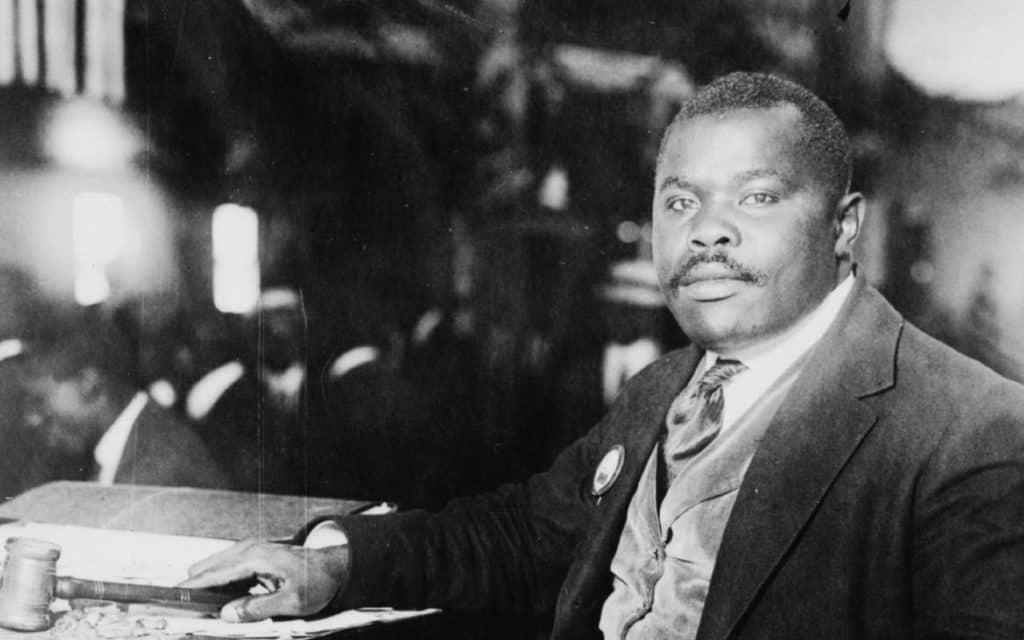
Black separatist Marcus Garvey
“The supreme function of statesmanship is to provide against preventable evils,” said Enoch Powell. Instead, the United States imported new evils via the Civil Rights Movement and the 1965 Immigration Act. As Christopher Caldwell argued in The Age of Entitlement, the Civil Rights Movement threw out the constitutional order. We tried to believe that racial differences either didn’t matter or could be ended.
The American people believed this because they were told — falsely — that this new approach was a fulfillment of the American mission. Martin Luther King Jr. didn’t believe in colorblindness any more than he believed the Bible or his martial vows. However, he told white Americans what he wanted them to believe: “When the architects of our republic wrote the magnificent words of the Constitution and the Declaration of Independence, they were signing a promissory note to which every American was to fall heir.” This didn’t ask white Americans to reject their heritage or identity, but to expand it.
We don’t know if King believed this or if he was being cynical. Either way, it worked. Colorblindness became patriotism. Today, conservatives are the last people who still believe in it. Modern “civil rights” campaigners, self-declared “abolitionists,” Critical Race Theorists, and Black Lives Matter campaigners have moved on. They no longer need to pay lip service to American institutions. They can scrap the whole thing.
American conservatives — mostly white — watch in disbelief as mobs topple heroes and radicals rewrite history. Yet most conservatives are unwilling to embrace white identity and instead say America was always for everyone. Most non-whites and progressives don’t buy it. President Donald Trump’s “1776 Commission” offered an idealistic but inaccurate version of America’s history. President Joe Biden revoked it via executive order. In a country without cultural unity and even the common ground of a shared flag or national anthem, conservatives cling to the Constitution.
Politicians and soldiers pledge to defend the Constitution, not a monarch. They swear to fight against its enemies, foreign and domestic. The Constitution is part of our sacred myth and (theoretically) has power behind it. It is the guarantor of the liberties we still possess. If the Constitution is discarded or becomes an ever-shifting “living document,” conservatives have no place to which they can retreat.
Perhaps we should welcome this. In practical terms, the Constitution is already gone. We can’t let white conservatives live in their dreamworld any longer. Time is running out.
To wake whites up, we need foolish leftists. In Rules for Radicals, Saul Alinsky warned his fellow subversives against ceding symbols such as the American flag. He understood that people hear what they want to hear. Conservatives are cheap dates. They will surrender to radical policies if there are couched in soothing words about American patriotism.
For that reason, I endorse Elie Mystal’s book. He’s a fire bell in the night. He gives white conservatives no comforting illusions. Conservatives who think their America still exists need people like him.
Let National Review try to find common ground with the assertion the Constitution is “actually trash” written by “actual monsters who were trying to protect their rights to rape the humans they held in bondage.” (p. 1) “Why would I give a f**k about the original public meaning of the words written by these men?” Mr. Mystal asks. Why indeed? “They didn’t ask anyone who looked like me about the Constitution,” he said on The View. Exactly. Elie Mystal has nothing to do with the historic American nation. He has nothing to do with us.
The heart of Mr. Mystal’s case is that while there might be some good in the Constitution, it’s “never been applied to all of the people actually living here.” Thus, the originalist view of the Constitution “is little more than an intellectual front for continued white male hegemony.” (3) He goes on:
I bring up my background in the law [note: he passed the bar exam but “never completed the rest of my bar application”] because hatred [emphasis in original] is a pretty big reason I’ve written this book. Not the healthiest emotion, I know, but for me it’s clarifying. What conservatives do and try to do through the Constitution and the law is disgusting. They use the law to humiliate people, to torture people, and to murder people, and tell you they’re just “following orders” from the Constitution. They frustrate legislation meant to help people, free people, or cure people and they tell you it’s because of “doctrinal interpretive framework.” They use the very same legal arguments that have been used to justify slavery, segregation, and oppression for four hundred years on this continent and tell you it’s the only “objective” way of interpreting the law. (4–5)
Mr. Mystal says law is subjective (“not science, it’s jazz”). In that case, it is not law. Force is all that matters, and courts have no purpose.
“I make my argument for why the [musical] notes that I like, people and activities I like, should be protected and promoted, and I’m not ashamed of it,” Mr. Mystal writes. I welcome this. Maybe it will convince whites that words on paper won’t protect them against a lust for power. “Most people assume the law is a function of ‘both sides, operating in good faith,’ he writes, “without wrestling with what the polity would look like if conservatives actually got their way.” (5) Again, I’d change nothing, except that it’s white conservatives who think “the law” has some force of its own. Of course, a conservative polity would be marvelous.
Mr. Mystal’s utter subjectivity is a joy:
Here’s one of my little rules for constitutional interpretation: if Republicans agree with me, I need to think again about how what I’m saying can be used to hurt women, people of color, or people who are LGBTQ. If Republicans are for it, chances are there’s something about my law that can be weaponized against vulnerable communities, otherwise I wouldn’t be getting conservative support. (23)
Mr. Mystal thinks profanity serves for profundity. Amidst various F-bombs and wild charges (Jeff Sessions is a “Klan sympathizer,” Brett Kavanaugh is an “alleged attempted rapist”), he argues that he can’t be “dispassionate” because a Supreme Court decision “directly affects the likelihood of me getting shot to death by the police while driving to the store.” Whites must concede their rights and sovereignty because Mr. Mystal is deluded. He is vastly more likely to be shot by blacks than by the police. I’m sure he does not know that 10 percent of all whites and Hispanics who die from homicide are killed by a police officer compared to just 3 percent of black homicide victims. This is because the black homicide death rate is 13 times that of whites.
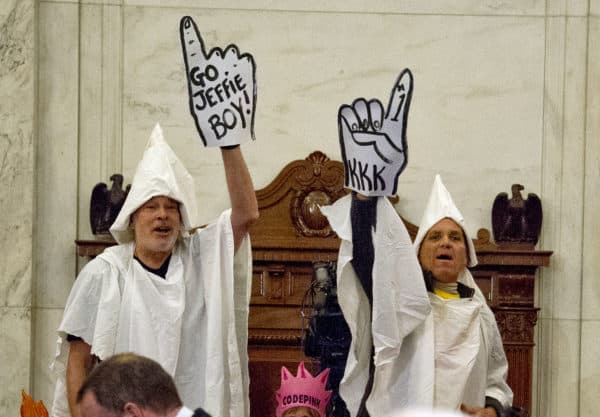
Unidentified men dressed as Ku Klux Klan members protest prior to the United States Senate Judiciary Committee confirmation hearing on the nomination of US Senator Jeff Sessions to be Attorney General of the United States on Capitol Hill. (Credit Image: © Ron Sachs / CNP via ZUMA Wire)
Casually, Mr. Mystal takes swipes at the jury system, judicial review, and the idea that races can properly judge or police members of other races. At one point, he cites Peter Thiel’s lawsuit against Gawker to show that conservatives are the real “cancel culture.”
[T]he case got in front of a jury in the state of Florida, and, well, let’s just say that if you ever find yourself trying to explain how laws work to a jury comprised of ‘Florida Man,’ you’ve probably already lost. (15)
Imagine trusting a man who wrote these lines serving on a criminal-trial jury:
- “Once you give cops an inch of daylight under the Fourth Amendment [unreasonable search and seizures] they will brutalize Black people for miles.” [55]
- “As a Black man in this country, I am prey, and the cops are my predators.” (69)
- “Most white people want there to be somebody to call when they feel threatened by Blackness.” [74]
- “There are no good cops or bad cops. There are just shitty white people.” [75]
- “What I can tell you is that when white people want your shit, they will take it, and Black people will rarely be justly compensated for the destruction of their wealth.” [92, on eminent domain]
- “[B]ecause courts are slow and infected by racist white people themselves, it might take decades or, as in the case with jury selection, a century for courts to catch up with the new way white people have figured out to be racist.” (106)
- “[Originalists] think the Constitution can only be as good as the worldview of the small-minded slavers and colonists who wrote it, and because of that they insist the death penalty must be constitutional.” (115)
- Originalists say that we can understand what they [the Framers] really meant by looking at what they did. I say I don’t give a f**k about what those depraved a**holes actually did. (116)
- “[W]hen white people see actual equality, they turn angry or violent. Come on. Twenty-first-century white people got so pissed of [sic] that a Black person got an equal employment opportunity as president that they turned to a vicious, bigoted, stupid person to save them, and stuck with him even as he helped get everybody sick.” [141]
- “As I keep saying, even the ‘best available’ nineteenth century white men were racist assholes.” [145]
- “Conservative judges will find a way to do racism. They literally always have. There is no law, rule, or constitutional freaking amendment that will stop them.” [208]
- “If it were up to me, I’d light the entire Constitution on fire and start over with a document that wasn’t so goddamn racist.” [237]
The fight against whites’ inherent depravity never ends. It’s racial Calvinism.
The only time conservative white men have agreed to share power is when other white men make them do it at the point of a gun. And whenever those more enlightened whites lose the will and the nerve to keep stuffing equality and fairness down the throats of their objecting brothers and cousins, conservative forces retrench, recalibrate, and reemerge with new strategies to violently assert white male dominance, and new legal theories to justify their supremacy. [129]
The most spectacular chapter is “A Jury of Your White Peers.” The racial mix of juries matters. We should seriously consider whether a jury of “your peers” must be a jury of your own race.
The point of a trial by jury, if there is one, is to be judged by a community of your peers. But Black people are and have always been brought up on charges by a white prosecutor, in front of a white judge, or have their guilt or innocence judged by an all-white or predominantly white jury. That’s not ‘impartial’ justice; it’s white justice imposed on Black bodies by a system that treats white people and their experiences as the default. (101)
He’s right for the wrong reasons. White experiences and our collective ideas of justice and law are the norm because America was built by whites. Minorities won’t understand that any more than I can fully understand the Japanese concept of law. If Mr. Mystal were making a general point, it follows that we can’t be judged fairly by those not of our race.
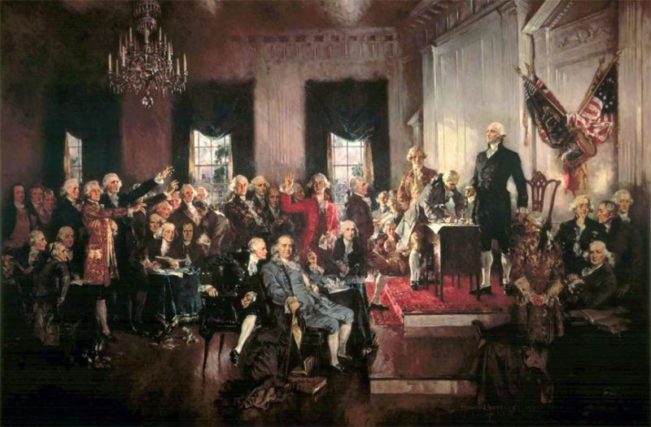
The Constitutional Convention
Mr. Mystal says the semi-sacred Constitution the Framers gave us means nothing to him, adding, “As a Black person, I do not even acknowledge the legitimacy of the original Constitution, much less think our modern rights and responsibilities can be understood only through its lens.” (126) He wishes the Constitution had been scrapped after the Civil War, and that we instead had the 1996 South African Constitution, which “now stands as a model for the world.” (127).
“We should defend the principles enshrined in our laws, not the random text of the laws themselves,” Mr. Mystal writes. (29) If laws are “random,” why bother with them? And who determines the principles? Apparently, public opinion. Mr. Mystal argues that the Miranda ruling may have been a good thing, even if it was entirely invented by the Warren Court. The invention survives “because it is popular.” [80]
Sometimes, Mr. Mystal contradicts himself. He says that then-governor Ronald Reagan signed a law banning open carry in response to Black Panthers “being able and willing to defend themselves from racist Americans.” (34) Yet the same chapter ends with this: “Gun rights are not about self-defense. They literally never have been. Gun rights are about menacing, intimidating, and killing racial minorities if necessary.”
Most white gun owners today probably want more blacks buying guns, but Mr. Mystal can’t see support for the Second Amendment as anything but racism: “Republicans will not make the killing stop, because they still think that near-unfettered access to guns is the only thing keeping them safe from blacks.” Republicans also don’t know “that shooting black people is not okay.” (39) “’Self-defense’ is how white people get away with murder,” he adds. (63) Still, Mr. Mystal is right to link gun ownership and fear of crime, though not in the way he thinks. We don’t have a gun problem; we have a black crime problem.
Mr. Mystal concedes that the constitutional amendments passed after the Civil War fundamentally changed the Constitution:
The Reconstruction and Nineteenth Amendments, on their textual face, obliterate the structures of white male supremacy this nation was founded upon. They obliterate whatever new structures white guys will think of next. These amendments are supposed to win the debate on whether we’re going to be a racist country or not. (132)
However, just a few sentences later: “The people who wrote and voted for the Reconstruction Amendments were the best generation of white men America had yet produced, but they were still racist, sexist, flawed white men.” These amendments change everything, but they also don’t have any real meaning. What matters is what people think about them. Besides, racism taints everything in the past. The target of equality keeps moving, but we better catch it. Otherwise, the country shouldn’t exist:
Equality and fairness must meet the standards of our modern definitions of those ideas, or else the entire American experiment is illegitimate. I mean that without hyperbole. (133)
Mr. Mystal takes this position because blacks didn’t build the political order and had no political power until the 1964 Civil Rights Act. He also points out correctly that even the authors of the Fourteenth Amendment didn’t want social equality for blacks. (151) Therefore, unless the text of the Reconstruction Amendments is interpreted according to today’s ideas rather than the authors’ original intent, blacks are still living under their captors’ laws. If this is true, blacks must finally “break free.” Unfortunately, Mr. Mystal adds: “I’m not a Black Nationalist, because I believe the Reconstruction and Nineteenth Amendments [if correctly interpreted] could redeem this whole bigoted and misogynist enterprise. But white people won’t let them. It really is that simple.” (134)
Whites also keep getting in the way of the power he needs to push his goals. He demands “that my peaceful protest . . . be treated with the same permissiveness the cops accord to a mob of white insurrectionists storming the nation’s Capitol, but white people tell me no, no, no.” [134]
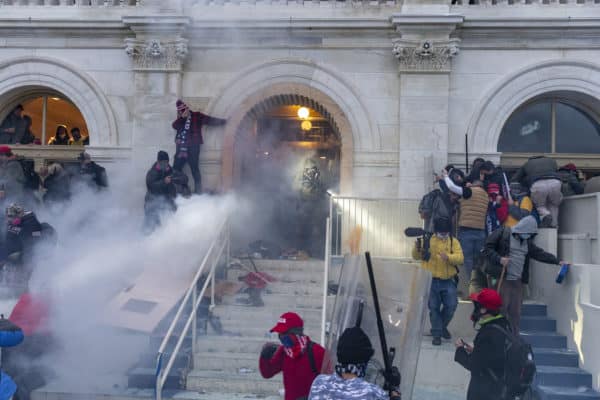
January 6, 2021, Washington DC: Police use tear gas around Capitol building where pro-Trump supporters breached the Capitol. (Credit Image: © Lev Radin / Pacific Press via ZUMA Wire)
“These [Reconstruction] amendments are a tonic white people refuse to drink,” he argues. “They can cure the Constitution of its addiction to white male supremacy, if white people would just take the medicine.” (135) “Lots of white people like to act like they are the ‘default’ people in the country, and, well, the law treats them as such,” he says. (157) One wonders just how much farther white people must go in tilting the country in favor of non-whites.
Mr. Mystal inadvertently gives us another powerful argument for white nationalism. He points out that an “originalist” understanding of Reconstruction Amendments that could have saved America must recognize that those amendments permitted segregation and Jim Crow. That is why a conservative, literalist position is doomed. Conservatives dare not oppose modern civil rights laws for fear of being called racist, and therefore invent “originalist” arguments that can be twisted into support for modern forced egalitarianism.
Mr. Mystal is correct to point out incoherence of this kind. The conservative interpretation of the Constitution and these amendments can be coherent only if conservatives think as the founders did: Race is real, races are different, America was founded as a white country, and we have the right to defend our interests. If the Constitution itself is at risk, will they finally find the courage to understand original intent?
Mr. Mystal argues that “reverse racism is not a thing,” apparently because we haven’t been discriminated against enough or reduced to a minority. Even to bring up the possibility that whites could be a mistreated class is akin to heresy. “To call white people a suspect [or protected] class is to render the entire phrase meaningless.” (157)
In the end, we have nothing left but a will to trample all the rules and norms that get in the way of political goals. “The structure of the Senate is racist,” Mr. Mystal says, deriving from a document “written by slavers and colonists who knew exactly the white supremacist society they were trying to write into existence.” (229)
Mr. Mystal wants to abolish the Electoral College. If not, “we should just start the whole experiment over from scratch.” (234) If all else fails, demographic replacement will ensure progressive triumphs. “In a free and fair election, there are just enough white people who reject their white supremacist arguments. When those white people can be linked up with the emerging majority of nonwhite people in this steadily browning country, conservatives lose.” (242) If we are simply to be overwhelmed, why should we pretend that we are part of the same country?
Perhaps the most breathtaking argument is in the epilogue. Mr. Mystal argues that it is fine for Republicans or Democrats to want to pack the court. “[T]he Supreme Court is already a super legislature that works to frustrate and disrupt law passed by democratically elected representatives,” he says. I agree. Of course, what Mr. Mystal likes about the court, I despise: “[A]bsent a couple of decades in the middle of the twentieth century, that super legislature almost always works against the interests of minorities and women.” (252) This of course means desegregation, non-white immigration, the destruction of freedom of association, and other “civil rights” laws that remade America. But now that the GOP has put a “conservative” majority on the Supreme Court, suddenly it’s too powerful.
Again, I welcome this crude analysis of power. Good politicians should select judges that they know will “vote” correctly. If racial conservatives had selected justices more carefully, we wouldn’t have had the farce of Brown v. Board of Education or other disasters. Dragging the Court into the partisan muck demystifies the Constitution. It also would be another example for conservatives that the constitutional order they are defending is threadbare.
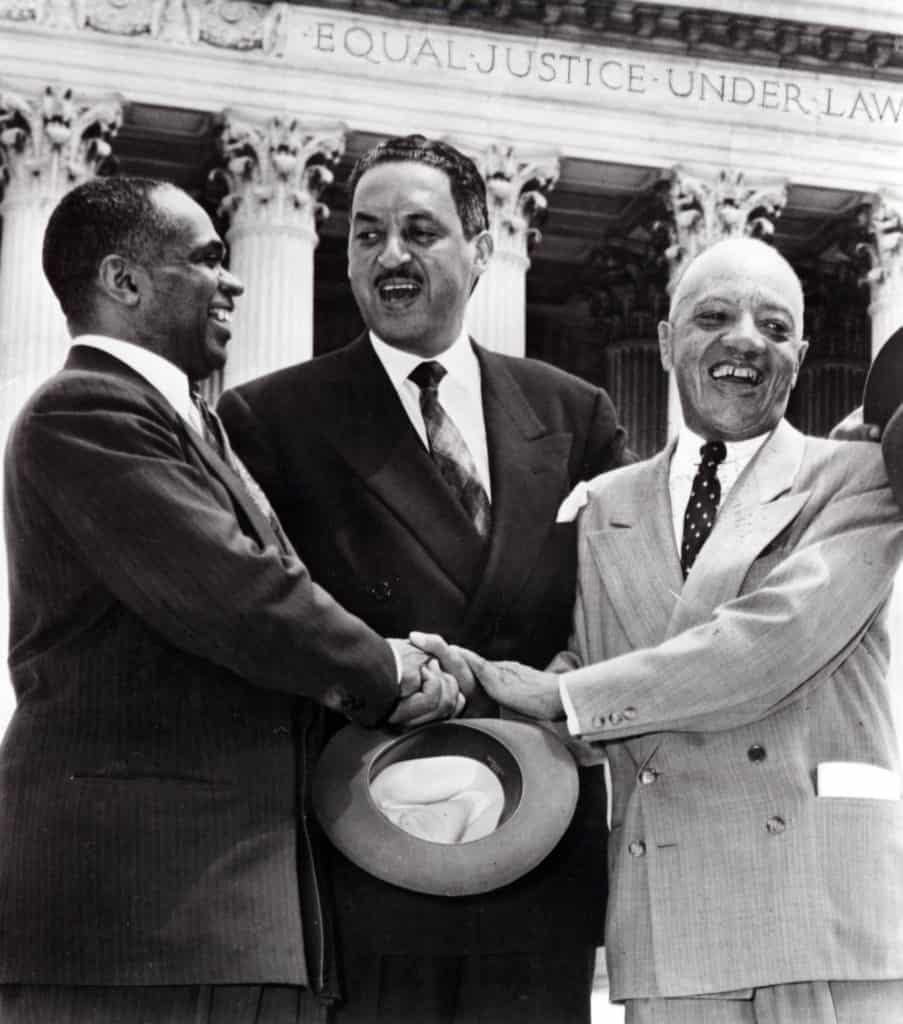
May 17, 1954 – Washington , District of Columbia, Thurgood Marshall (C) and fellow attorneys George Hayes (L) and James Nabrit rejoice outside the Supreme Court after the winning decision ruling out school segregation in Brown vs. Board of Education. (Credit Image: © Keystone Press Agency / Keystone USA via ZUMAPRESS.com)
Mr. Mystal’s arguments are crude, practical, and driven by pure racial resentment. They show exactly what our opponents want and how they justify it. That’s why whites should read this book. Mr. Mystal’s malevolence will destroy their illusions about an objective “rule of law,” make them understand that politics is about power, and give them the courage to be white advocates. Our opponents no longer sugarcoat their poisons. Whites who “take their medicine” will become wise.
Mr. Mystal’s book is an unwitting declaration of incompatibility. We don’t see courts or the law the same way and can’t work under the same set of rules. Progressives preaching against us incite hatred for us. This tilts justice against whites. Jurors are human, driven by their emotions. Non-whites have the force of racial identity and group solidarity. Whites have only a piece of paper that Mr. Mystal says is trash.
The Constitution is supposed to be sacred, but you can curse it to wild applause. It is like a dying god, occasionally protecting us but always losing strength. When it finally snuffs out, I’ll celebrate. It will leave behind no illusions.
When we have a home of our own, we’ll remember the previous order’s successes and failures. However, we must always remember politics is about who, not what. The nation is important; policies are just the tools. The end, the well-being and upward development of our people, is what’s important. The means are important, but secondary.
Mr. Mystal teaches us one final lesson. The Constitution was written by racially aware men, but they didn’t go far enough. Mr. Mystal’s presence on this continent is proof of that. His book shows that “America” is several peoples under one legal code. I sincerely thank Mr. Mystal for ending my lingering reluctance to accept painful truths. In mixed-race America, justice is never blind. A trial is no less political than an election. On justice’s scales, one drop of blood outweighs the thickest legal code or the most sacred Constitution.















